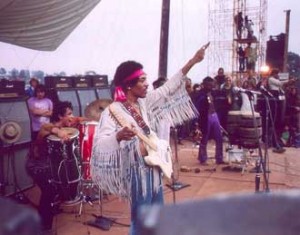
By Shirley Steinberg
It’s been 40 years. Woodstock, the love mudfest, gave us a four-decade-long weekend memory – and divided us into four groups: those who were there (about half a million), those who said they were there (but weren’t), those who wish they had been there (like me, whose parents locked me in a suburban basement for three days) and those who won’t pick up on my references.
I’ve been trying to be there for years, waiting for the next rock happening to occur. I’ve schlepped my rooted-in-the-sixties self to a plethora of ersatz festivals in North America, lookin’ for the love, lookin’ for the mud, lookin’ for the new era-defining moment that will usher in the Age of Aquarius. I think I’ve been lookin’ in all the wrong places.
I haven’t come across a child of God as I’ve walked along the road to these different festivals of modern times. Don’t have to go up in the country any more, Yasgur’s farm paradise has been paved and parking lots with awning-covered beer stands replace the bucolic space that intuitively welcomed tie-dyed revellers who were once put down, just for gettin’ around.
When the admission gates got too crowded at Woodstock, the promoters opened them and stopped charging. Can’t happen now; I buy my tickets online, an average of $80 for a full-day pass (add on the $8 transaction fee).
After depositing my ticket with SECURITY-shirted gatekeepers, I get a paperish bracelet secured around my wrist, indicating my day’s pass. The colour of the pass indicates exactly how much I’ve invested in the weekend, as prices increase with the days purchased. Labelled as a one-day attendee, I’m always acutely aware that my commitment to the event may be questionable.
Entering the land to set my soul free, I’m usually handed a flyer of some sort – often for an all-inclusive resort in Jamaica (the one where all the residents were de-homed to make way for a behemoth hotel complex named after summer shoes). Since summer festivals are hot, the search for water is always my first thought. At Woodstock, there were free-flowing hoses, water troughs and stands throughout the venue. There was also a lot of rain.
Contemporary music festivals have delineated areas in which delineated items/events are allowed to occur. Water is manifested in two incarnations: stands charging between $3 and $5 for plastic bottles – or free water, dispensed through purifying taps. The latter is easy to spot – long lines snaking toward ecologically friendly Aquarians. The catch: I always forget to bring my politically correct water bottle.
I never allow cynicism to cloud me, as I’m intent on getting back to the garden of pure rock ‘n’ roll abandon. Stages pepper the setting, and selecting a nesting spot becomes essential after quenching my thirst.
Moving gingerly between blankets and lawn chairs, I wonder how attendees carried all their belongings. Strollers wide enough to accommodate a small bovine stand guard over each plot of land. A sense of order in the homesteader’s patchwork, finding room is not easy if one isn’t early. Boundaries are clearly marked, and one learns to jump over borders without stepping too deeply on another’s blanket.
No loudspeaker guides the flocks, but we all know where to go. The food area is on one end of the grounds, and many are relaxed to realize their favourite food is in supply. Mini-Pizza Huts, Subways and Thai Expresses are but a pathway away. There are still the mom and pop tents, but the weekend rental prices are so high that many set up outside of the festival, hoping someone will stop by for a falafel or miso soup before going in (it has to be ingested off-site, because no food can be brought into the grounds).
Oh, the music. Almost forgot. Bands are scheduled about 40 minutes for a set. They are ushered on and off by the SECURITY T-shirts, and shouldn’t go overtime. Sometimes, the bands are terrific. But, with short sets, it isn’t easy to be taken up, up and away. The festival has to end at 11 p.m. because, I guess, it takes so long to get those leviathan strollers out.
This Woodstockian revisit has enabled me to stop trying to revive the past. Jimi, Janis and Jerry are gone. Lots more are fixin’ to die. Wavy Gravy is still cool, has two radio shows on Sirius Satellite Radio, and David Crosby is the father of Melissa Etheridge’s kids …
Time has come today, the rules have changed today. I’m realizing that nostalgia is for those with nothing better to do than to wish they were somewhere else.
I’m glad Woodstock happened, wish the vibes were still here, but they’re not.
Joni Mitchell didn’t go to Woodstock; instead, she decided to appear on The Dick Cavett Show. Watching the festival from her New York hotel room and gathering details from boyfriend Graham Nash, she penned her musical homage to the event. Nice irony: The definitive musical account of Woodstock came from someone who wasn’t there.
Shirley Steinberg is a professor in the Faculty of Education. This article first appeared in the Globe and Mail on August 15.
